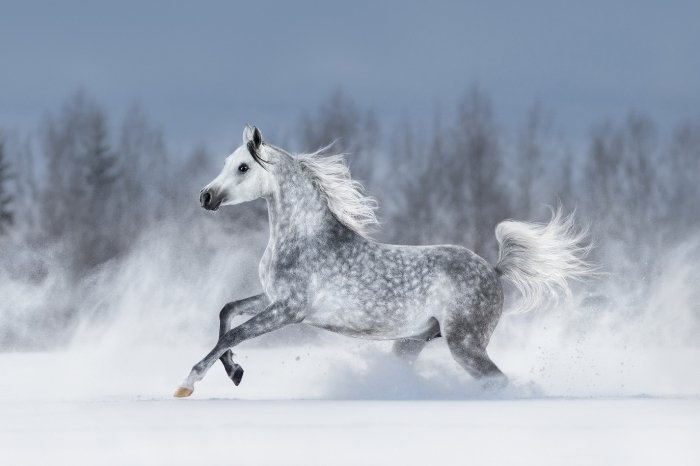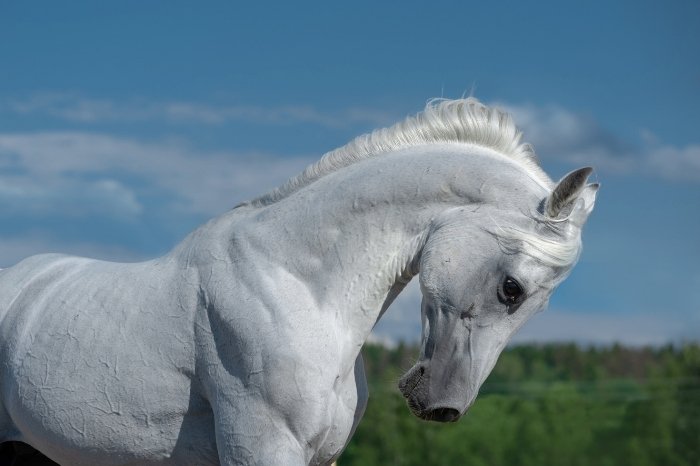Last Updated on April 4, 2022
Arabian horses really are one of the true beauties of the equine world! With their refined, dished faces and sleek bodies, this elegant breed is one that any horse lover would appreciate. But when it comes to life span, how long do Arabian horses live?
Let’s find out more about the wonderful world of Arab horses and see how long they could live for!
What Is An Arabian Horse?
Arabian horses are one of the most beautiful breeds in the equine world. They are also one of the oldest breeds, with records of Arabian horses going back as far as the seventh century A.D.
The Arabian horse is a hotblooded breed. This means it is very fine and light in body structure and has a fiery and bold temperament. In ancient times, this made the Arabian the perfect horse for long battles and escapades in hot desert conditions.
To look at the Arabian horse, you might think that they are a fragile and dainty breed. They have very thin legs, a long, arching neck, and a high tail carriage. The head is different from any other breed of horse, with a finely chiseled bone structure and a dished face.

However, don’t be fooled by their elegant appearance! The Arabian is one of the most rugged and courageous horse breeds of modern times. This makes it popular for equestrian sports such as endurance riding.
Another reason the Arabian horse is so popular with long-distance riders is their ability to cover large amounts of ground rapidly, at a pace that is comfortable for the rider. This beautiful horse appears to almost float above the ground effortlessly.
The Arabian horse breed standard has barely changed since ancient times. Breeding programs are at maintaining the characteristics of the breed rather than modifying them. After all, why mess with perfection?!
Read more about War Horses -Top Breeds Revealed!
What Factors Affect Arabian Horse Life Expectancy?
Some health problems are common to all horses, and others are more common in just the Arabian breed. Any of these diseases and disorders could affect the life expectancy of your Arabian horse. Many of these problems occur as a result of poor breeding, so it is essential to breed responsibly to prolong the healthy life of these horses.
Here are some of the main hereditary health conditions that may affect the life expectancy of an Arabian horse:
- Cerebellar Abiotrophy – this is a condition that affects the nervous systems of foals. It is passed on genetically from the sire or dam. It causes trembling and wobbliness and is uncurable.
- Lavender Foal Syndrome – this condition also affects the nervous system of foals, and they do not survive for long after birth. This genetic condition gets its name as foals with Lavender Foal Syndrome normally have a pale lavender, pink, or silver coat color.
- Severe Combined Immunodeficiency – this condition results in a poor or inadequate immune system in foals. This leaves them susceptible to infections which can cause diarrhea, high temperatures, and poor breathing.
- Occipitoatlantoaxial malformation – this inherited condition causes abnormal development of the vertebrae in the neck. These press on the spinal cord, causing neurological symptoms.
However, apart from these hereditary conditions, the Arabian horse is generally a very healthy breed. Arabian horses used for racing and endurance riding sometimes suffer from long-term lameness, which may shorten their lifespan. It is also reported that tumors of the intestines are more common in Arabian breeds than other types of horse.
Other factors which affect the average Arabian horse lifespan include nutrition, dental care, hoof care, and parasite infestations. It is essential to take the best possible care of your Arabian horse to help them to live a long, healthy, and happy life.
What Is The Average Arabian Horse Lifespan?
So, let’s get down to our question – how long do Arabian horses live? Well, these rugged and tough little horses have quite a long lifespan! The average age an Arabian horse lives to is from 25 to 30 years.
How does this compare to other breeds of horse? The Arabian horse is completely in line with the average life expectancy of the horse population in general, which is also 25 to 30 years.
Arabian Legends: Outstanding Arabian Stallions and Mares
Smaller breeds, such as native ponies, have a longer than average life expectancy. They can live for up to ten years longer than the average horse.
Large draft breeds have a shorter than average life expectancy. It is not unusual for a draft breed horse to only live to 20 years old.
How Old Do Arabian Horses Live?
So now we know that the average Arabian horse will live for 25 to 30 years. But do any of them ever live for longer? You might be surprised at just how long some Arabian horses live for!
Some of the oldest horses in the world had Arabian bloodlines, including some world record holders! These are some of the oldest horses with Arabian bloodlines:
- Badger, an Arab-Welsh cross, lived to 51 years of age. Badger died in 2004 and at this time held the Guinness World Record for the oldest living horse.
- Orchid, an Arab-Thoroughbred cross, lived to either 49 or 50 years old – the actual figure is disputed! Either way, this still makes her the oldest female horse in the world.
- The oldest Polish Arabian horse in the world is Magic, kept at a ranch in California. In 2015 she celebrated her 46th birthday, but since then no updates have been given about her health.

It is hard to believe that some horses have lived for so long. Take good care of your Arabian horse and it could live to a grand old age!
Summary
So, as we’ve learned, Arabian horses live on average for 25 to 30 years. This is in line with the average lifespan of the horse population in general. However, the life expectancy of Arabian horses is dependent on their overall health and quality of life, as well as their genetics and breeding.
We’d love to hear your thoughts about the life expectancy of Arabian horses. Have you ever met an Arabian horse who lived to a very old age? Or maybe you have a question about the average lifespan of an Arabian horse? Please add a comment below!
Who was the first Arabian horse?
While the exact origins of the Arabian horse are still a mystery, the general belief is that Arabian horses were domesticated in North Africa or the Middle East. The first horses to be domesticated in the area that is now known as Arabia were brought by Neolithic nomadic people migrating from the Eurasian steppe regions.
It’s distinctive silhouette was first seen in the art of ancient Egypt over three thousand years ago. However, it was the nomadic tribes of the Arabian desert, known as the Bedouin, who created and refined the pure breed that exists today.
What is the oldest living Arabian horse?
Arabian horses typically live between 25 and 30 years. While this is similar to the average horse population, there are documented instances of Arabian horses living well past their 40’s. The oldest registered Arabian in the U.S., Bob Mann’s horse Magic, died on March 25, 2020 in San Diego, at the age of 51 years old. Magic was a Polish Arabian mare, born on June 15, 1969, in Oregon. She’s lived most of his life in Southern California where she has given birth to seven foals. Magic has had quite an active life on the ranch. She competed as a professional barrel racer and pole bender for full 25 years. At a competition at Valley Center Vaqueros Club in 2011 she took home seven awards! That’s some magic!
Why are Arabian horses so special?
The Arabian horse is one of the oldest breeds of horse in the world. Arabian horses have been present in the Middle East since at least 1000 BC and were used as war mounts for the Moors and Arabs. The Moors introduced the Arabian horses to Europe during their invasion of Spain.
It’s no surprise that Arabians were used as war horses as they are sturdy and sound, with superior endurance. They’re especially noted for their stamina and excellence in endurance races. In addition to these physical attributes, Arabians are highly intelligent animals that can be trained to do anything. These characteristics have made them the preferred breed in many areas, such as show-jumping, eventing, racing, dressage, and hunting.
Why do Arabian horses lift their tails?
Horses use their tails to communicate their emotions. In a study conducted on horses at the University of California, it was found that the horses’ tail wagging was associated with increased activity in the hypothalamic-pituitary-adrenal (HPA) axis and sympathetic nervous system, and also increased levels of serum cortisol, suggesting that tail wagging in horses is an innate behavior with positive emotional significance. The Arabians are known for being proud and high-spirited horses. They like to raise their tails as as sign of pride, but also to express their excitement and freshness.
Why are Arabian horses so smart?
The Arabian breed is said to have a higher level of intelligence than other breeds of horses. They are very intelligent, and they also have a good memory. They can easily distinguish between people, objects, and sounds. This breed is often considered as the best horse breed for training because of their ability to learn quickly. They are extremely loyal, friendly, and brave.
The Arabian is also one of the oldest breeds of horses. No one can really tell but maybe that’s the reason they are so smart?

Kate Chalmers is a qualified veterinary nurse who has specialized in horse care for the vast majority of her career. She has been around horses since she was a child, starting out riding ponies and helping out at the local stables before going on to college to study Horse Care & Management. She has backed and trained many horses during her lifetime and competed in various equestrian sports at different levels.
After Kate qualified as a veterinary nurse, she provided nursing care to the patients of a large equine veterinary hospital for many years. She then went on to teach horse care and veterinary nursing at one of the top colleges in the country. This has led to an in-depth knowledge of the care needs of horses and their various medical ailments, as well as a life-long passion for educating horse owners on how to provide the best possible care for their four-legged friends.
Kate Chalmers BSc (Hons) CVN, Dip AVN (Equine) Dip HE CVN EVN VN A1 PGCE
